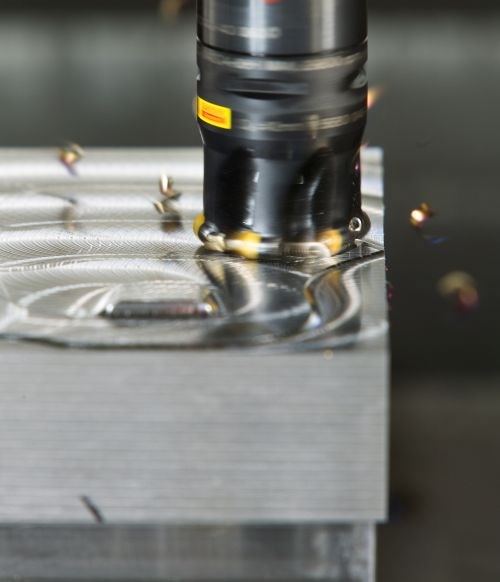Mold and Die as Key Indicator Brings New Cutting Tool Tech at IMTS
Several cutting tool suppliers here at IMTS predict that moldmaking should continue to demonstrate growth potential as the focus shifts from work sent overseas back to the U.S. As such, many cutting tool suppliers have been motivated to reintroduce and develop technology for this niche marketplace, and here at IMTS there is plenty to see. Here are a few highlights.

As a single industry, mold and die serves several industrial segments, establishing it as a strong indicator of the manufacturing base. Mold & die also has a global footprint that yields a high pressure environment demanding the most up-to-date technology so moldmakers can improve their productivity. Several cutting tool suppliers here at IMTS predict that moldmaking should continue to demonstrate growth potential as the focus shifts from work sent overseas back to the U.S. As such, many cutting tool suppliers have been motivated to reintroduce and develop technology for this niche marketplace, and here at IMTS there is plenty to see. Here are a few highlights.
"The mold & die market is demanding a lot of cutting tools, especially for milling applications," says Juan Séculi, Global Product Manager Indexable Milling for Kennametal (W-1522). Under Kennametal’s Indexable Milling Team, the company has launched a number of new platforms tailormade for mold & die that can be seen here at IMTS, including the KDMB-KDMT (Kennametal Die&Mold Ball and Kennametal Die&Mold Torus) platform, which has been recently updated with new geometries and grades for the inch portfolio; high run-out accuracy; small diameters to compete against solid end mills; long reach steel and carbide toolholders; and, the ability to run milling operations in hardened steel up to 65HRc. Overall this is a platform targeted to run semi-finishing and finishing operations, where tool life and surface finishing quality are key.
According to Sandvik Coromant's (W-1500) Troy Stashi, Industry Specialist – Automotive/Milling Tool, performance and quality are at the heart of the mold & die industry, which is reflected in their booth this year. "Moldmakers want to use the cutting tool to maximum performance and Sandvik has developed tools to run at that maximum performance level, including an extensive line of profile milling tools that include both indexable solid carbide tools like our CoroMill Plura high-performance end mills, CoroMill 316 exchangeable head milling system, CoroMill 300 round insert cutter program, a well-established high-feed milling cutter, the CoroMill 210, and now a broad offering of drills and taps." In the fall, Sandvik is releasing its newest high-feed milling cutters and new line of face mills.
Over at Iscar (W-1800), Tom Raun, Specialist - Machine Tool OEM & Industry Projects explains that most recently the company has targeted larger diameter/to depth ratio holes—typically 8xd and above. "In many cases these holes need center drills, multiple long drills and reaming or boring tools to complete, and use peck drill cycles. We are looking to eliminate the peck cycles as well as the reaming/boring operation, in some instances."
Now Iscar is offering the SumoCham, a new replaceable tip drill available in lengths up to 12xD; for longer depths the Chamgun, a replaceable tip gun drill; for high productivity reaming applications, the Bayo-T Ream; and, the BTA drilling option for a more productive deep hole drilling.
Tom Benjamin, product manager for Walter USA (W-1700) notes that the company is "committed to providing tools and technology that the mold and die industry demands, as the high technology requirements for this market fit well with Walter’s capabilities." Here at IMTS Walter is featuring Protomax Ultra for hard part machining for mold & die.
Currently, Seco Tools North America (W-1564) supports hundreds of mold and die customers across the U.S., Canada and Mexico, with solutions for each unique applications, whether those include standard or custom products.
According to Gary Meyers, Seco Product Manager – Milling, "When developing products specific to mold and die, Seco Tools pays close attention to what components mold and die makers are currently machining as well as what materials and cutting operations they are using to get the job done. Most recently, Seco has noticed that, due to increased workloads, several mold and die makers are investing in new equipment to effectively tackle difficult applications and increase productivity. Therefore, Seco has a Component Engineered Tooling (CET) program where it can assist mold and die makers with a complete tool package, as well as offer advice on machine selection and set up."
At the Seco Tools booth, attendees can see a wide variety of cutting tool solutions specific to mold and die. A few include High Feed 2—a line of small diameter high-feed milling tools offering high feedrates and small depths-of-cut that can handle pocketing, ramping, helical interpolation, facing, contouring, slotting and plunging; Minimaster Plus—a line of end mills with replaceable carbide inserts that tackles tough milling applications in steel, stainless steel, cast iron and aluminum; and Jabro™ JHF180—a solid carbide high-feed end mill effectively machines hardened steel, so it is perfect for the production of small workpieces and cavities.
With work continuing to return to the U.S. market and mold manufacturers seeking out technology solutions to improve their productivity, cutting tools play an integral role, which is evident on the show floor.
Read Next
How to Use Continuing Education to Remain Competitive in Moldmaking
Continued training helps moldmakers make tooling decisions and properly use the latest cutting tool to efficiently machine high-quality molds.
Read MoreReasons to Use Fiber Lasers for Mold Cleaning
Fiber lasers offer a simplicity, speed, control and portability, minimizing mold cleaning risks.
Read MoreHow to Use Strategic Planning Tools, Data to Manage the Human Side of Business
Q&A with Marion Wells, MMT EAB member and founder of Human Asset Management.
Read More




.jpg;maxWidth=300;quality=90)











